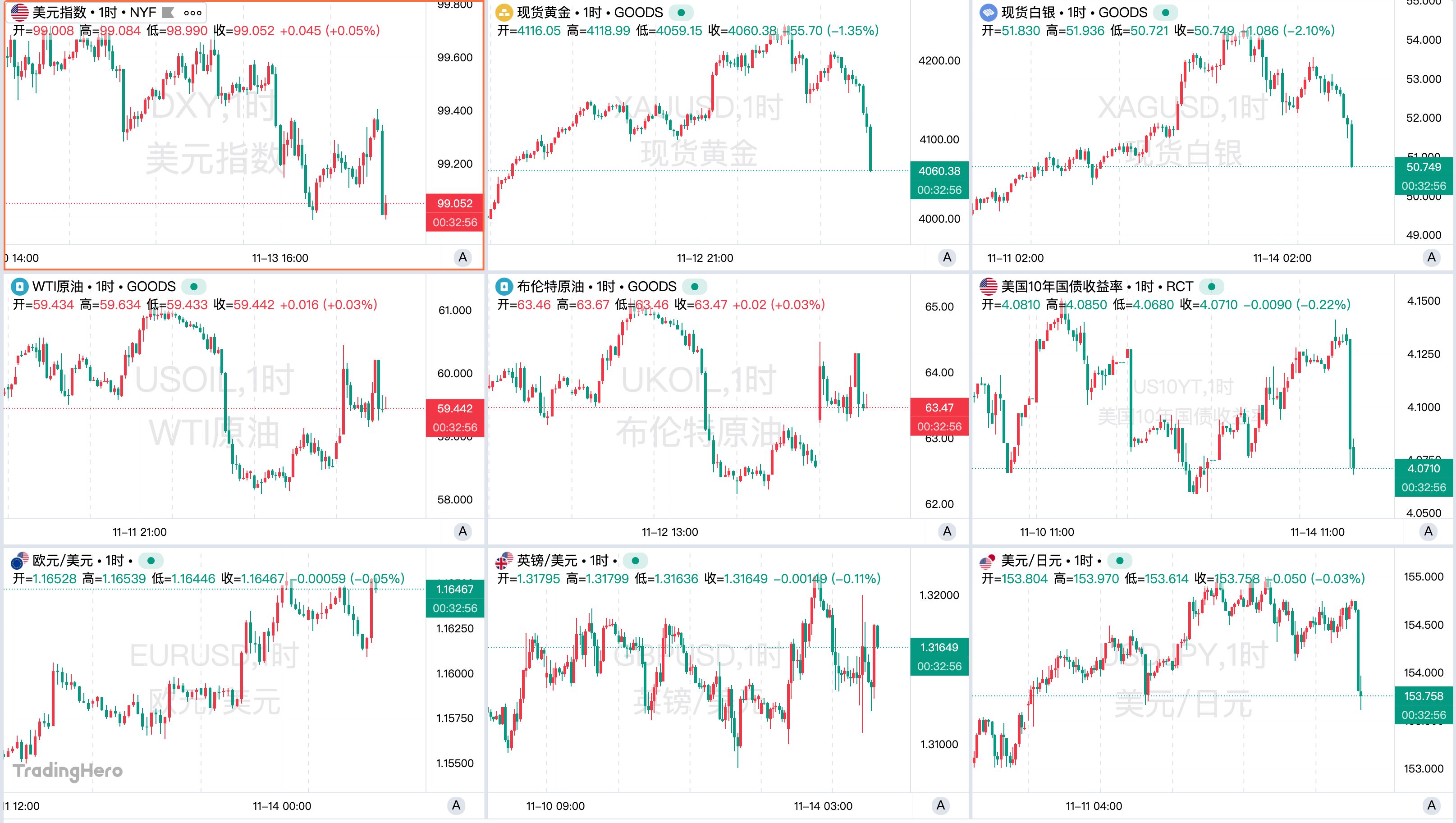Weekly Hot Picks: Data Disappearance Doesn’t Stop the Fed’s Hawkish Stance! Global Multi-Asset Markets Face “Backstabbing”
The U.S. government shutdown has ended, but the release of key data remains chaotic. The Federal Reserve has sent frequent hawkish signals, causing significant declines in gold, silver, stocks, and currencies on Friday. The U.S. has launched Operation "Southern Spear". Buffett delivered his farewell letter, and the "Big Short" exited abruptly. What exciting market events did you miss this week?
Market Review
US Dollar Index was slightly under pressure overall this week, once falling below the 99 mark, and is expected to record its second consecutive weekly decline. The longest US government shutdown has ended, but key economic data will still take time to be released. Federal Reserve officials have gradually released hawkish signals, reducing the probability of a rate cut in December.
Precious metal prices rose overall. Spot gold was boosted by the decline in the dollar and safe-haven flows, reaching as high as $4,245/oz. Spot silver showed a similar trend but with a larger increase, once rising nearly 10%. On Friday, both spot gold and silver plunged sharply, narrowing their weekly gains. Gold prices fell more than $100 in a single day.
In terms of oil prices, both WTI and Brent crude oil saw a sharp midweek drop followed by a volatile rebound. OPEC's latest monthly report shows its forecast for the global crude oil market in the third quarter has shifted from "supply shortage" to "supply surplus"; the IEA has raised its forecast for next year's global oil supply surplus for the sixth consecutive month, and expects demand to stop growing by the end of this decade.
For non-US currencies, Japanese yen against the US dollar fell below the 155 mark for the first time since February, with the market believing that Japanese officials may verbally intervene to curb the yen's decline. In addition, euro against the US dollar rose significantly this week. British pound against the US dollar was highly volatile; on Friday, Chancellor Reeves reportedly abandoned plans to raise income tax due to unexpectedly improved fiscal forecasts.
In US stocks, as investors rotated from tech stocks to non-tech blue chips, the Dow once performed brilliantly and hit a record high. However, as the market digested Fed policy risks and concerns over an AI bubble and high valuations, tech stocks plunged on Thursday, with all three major indices posting their worst single-day performance since October 10.
The cryptocurrency market continued to plummet across the board. Bitcoin fell below $95,000, and Ethereum once dropped below $3,100.

Investment Bank Opinions
Nomura expects the Federal Reserve to pause rate cuts in December.
UBS says gold prices remain in an uptrend and expects global gold demand this year and next to reach the highest level since 2011. JPMorgan Private Bank predicts that gold prices will break through $5,000/oz by the end of 2026.
The creator of the "Dollar Smile Theory" predicts that the dollar will fall by nearly 14% during the remainder of Trump's term. Crédit Agricole says the end of the US government shutdown may end the dollar's upward momentum.
Goldman Sachs expects that US stocks will underperform other markets over the next decade, with emerging markets providing the most lucrative returns.
Weekly Events
1. The Longest US Government Shutdown Ends, Key Data Like Nonfarm Payrolls and CPI Still Missing
On the evening of November 12 local time, US President Trump signed a temporary funding bill for the federal government, ending the longest government shutdown in US history, which lasted 43 days.
The bill provides funding for most federal agencies at current levels until January 30, 2026. It is estimated that this shutdown may have caused US GDP to fall by more than 0.1 percentage points.
After the shutdown ended, the release of economic data remained in chaos. National Economic Council Director Hassett said that due to the longest government shutdown in history, the October unemployment rate data will not be released, the first time in 77 years this has happened.
However, there are conflicting statements within the White House on whether the October nonfarm payrolls data will be released. Hassett said job creation data will still be calculated, but White House Press Secretary Leavitt previously said the entire employment report might not be released at all.
In addition, the October CPI, originally scheduled for release this Thursday, was not published as planned, and it is unclear whether it will be released in the future. Leavitt hinted the report might not be released, but Hassett did not comment.
The US Bureau of Labor Statistics is expected to update the economic data release calendar in a few days, but it may take months or even longer to return to normal data releases. After all, the agency faces many challenges, including staff shortages and vacant leadership positions.
Economists believe that although the October CPI and employment report may not be accurate enough, they can still provide some reference information for investors. In addition, the November economic report may also be delayed because statistical agencies need to complete the September and October reports first.
This week's ADP report shows that the US labor market slowed in late October, with US companies cutting an average of 11,250 jobs per week in the four weeks ending October 25. In addition, the US Small Business Optimism Index for October fell to a six-month low, dragged down by deteriorating profits and weakening economic confidence.
2. Fed Hawks Rise, Probability of December Rate Cut Plummets to About 50%?
Market analysis believes that unless there are major surprises in delayed data, the rationale for the Fed's third rate cut this year is rapidly weakening. According to CME "FedWatch", the probability of a 25 basis point rate cut in December is 51.6%. A month ago, traders believed the probability of a December rate cut was as high as 95.5%.
"Fed mouthpiece" Nick Timiraos pointed out that officials have clear differences on issues such as tariff impacts, reasons for job growth, and interest rate levels, and Powell faces the challenge of balancing various opinions.
On one hand, Fed Governor Milan continues to advocate for at least a 25 basis point rate cut in December, but believes 50 basis points would be more appropriate. San Francisco Fed President Daly also said that the slowdown in US job growth is mainly due to weak demand rather than reduced labor supply, and tariffs have not triggered widespread inflation, so further rate cuts should remain on the table.
On the other hand, several other officials are clearly hawkish, preferring not to cut rates again before January next year. St. Louis Fed President Musalem said there is limited room for further policy easing and caution is necessary. Vice Chair Philip Jefferson also emphasized that as the neutral rate is approached, it is reasonable to proceed with policy steadily.
Boston Fed President Collins believes that since inflation remains high and the government shutdown has led to missing key data, it is not advisable to cut rates further in the short term; maintaining current rates may be more appropriate, and further easing could hinder inflation's return to target.
Minneapolis Fed President Kashkari pointed out that economic activity is more resilient than expected and is cautious about the need for rate cuts. Cleveland Fed President Harker made it clear that current rates are still insufficient to curb economic overheating, and a restrictive policy stance must be maintained; inflationary pressures are expected to persist through the end of the year and into early next year.
Due to liquidity tensions in the $12 trillion short-term funding market, institutions are calling on the Fed to take stronger measures to ease the pressure. New York Fed President Williams emphasized that the Fed's resumption of bond purchases is a technical operation, not a shift in monetary policy.
Key New York Fed figure Roberto Perli said that bank reserves are no longer ample, and the Fed is about to start asset purchases to maintain liquidity, calling on Wall Street to actively use the central bank's standing repo facility.
On personnel changes, Atlanta Fed President Bostic suddenly announced he will retire when his term expires in February next year, avoiding internal controversy that could arise from reappointment. Bostic had been scrutinized for financial transaction disclosures; despite support from the board, his prospects for reappointment were bleak, and his retirement is seen as a compromise under political pressure, possibly weakening hawkish voices within the Fed.
White House official Hassett said this week that if nominated as Fed Chair, he would accept the appointment and support larger rate cuts, believing there is room for rates to be lowered, even proposing the rationale for a 50 basis point cut. He also pointed out partisan tendencies in Fed decision-making and plans to push for reforms in the Fed's research system.
3. US Launches "Southern Spear" Operation, Venezuela Deploys Guerrilla Tactics
On November 13 local time, the US Secretary of Defense announced the launch of "Southern Spear" operation, led by the "Southern Spear" Joint Task Force and US Southern Command, claiming its main goal is to combat narco-terrorism, eliminate the drug threat in the Western Hemisphere, and protect US homeland security.
At the same time, the US Department of Defense announced that the two main entrance plaques at the Pentagon were replaced with ones inscribed "Department of War." This move has drawn widespread attention to the intentions behind US military actions.
Reports indicate that Trump was briefed this week on various options for military action inside Venezuela but has not yet decided on the next steps. The report notes that Trump is still weighing the risks and benefits of expanding military operations.
Since early September, US forces have attacked at least 19 suspected drug trafficking vessels in the Caribbean and along the Pacific coast of Latin America, resulting in 76 deaths. The USS Ford carrier strike group has arrived in Latin American waters, accompanied by three Arleigh Burke-class guided missile destroyers. The carrier is carrying over 4,000 sailors and dozens of attack, reconnaissance, and support aircraft.
Venezuela is preparing to resist a possible US invasion through "people's guerrilla warfare." According to documents obtained by Reuters, Venezuela has completed combat deployments at more than 280 locations, with 5,000 missiles in place.
Due to insufficient training and outdated equipment, the country's military cannot sustain conventional warfare, so it plans to adopt guerrilla tactics and create street chaos to resist foreign enemies.
4. Possibility of Another Putin-Trump Meeting? Ukraine Says Talks with Russia Will Stop Before Year-End
On November 14, Russian forces launched a large-scale airstrike on Kyiv, the capital of Ukraine, killing at least one person and injuring 24. Almost all areas of Kyiv were attacked, including residential buildings, office buildings, and medical institutions, and the heating system was damaged.
Ukrainian President Zelensky said Russian forces used 430 drones and 18 missiles to attack multiple locations in Ukraine. Meanwhile, Russian and Ukrainian forces are fiercely fighting in Pokrovsk (Red Army City) in Donetsk, with a force ratio of 10:1 to 8:1 in favor of Russia.
Previously, there were new developments regarding high-level Russia-US meetings and Ukraine conflict negotiations.
Russian Foreign Minister Lavrov said that if the US resumes the proposal for a Russia-US presidential meeting and begins preparations, Russia is willing to participate in discussions. He also expressed willingness to communicate with Trump regarding concerns about Russia resuming nuclear tests.
US Secretary of State Rubio responded that a Trump-Putin meeting would require substantial progress toward ending the Russia-Ukraine conflict. Previously, Trump had shelved plans to meet with Putin due to differences over Ukraine.
In addition, on the 12th local time, the Ukrainian Ministry of Foreign Affairs announced that due to lack of results, Ukraine will suspend peace talks with Russia at least until the end of this year.
Russian Presidential Press Secretary Peskov responded to Ukraine's suspension of talks, saying that if Ukraine refuses to continue dialogue, it will have to return to the negotiating table in a less favorable position in the future. Russia will continue its special military operation until President Putin's goals are achieved. Russia remains committed to a peaceful resolution of the Ukraine issue and is open to political and diplomatic solutions.
5. South Asia Situation: Explosions in Indian and Pakistani Capitals Kill Dozens, Cambodia-Thailand Border Conflict Reignites
On Monday and Tuesday this week, explosions occurred in New Delhi, India, and Islamabad, Pakistan, killing 25 people and injuring 56. A car exploded near the Red Fort metro station in New Delhi, and a suicide attack occurred outside a court in Islamabad. Pakistan's defense minister declared a state of war, accusing India of supporting terrorism, which India denied. Indian Prime Minister Modi vowed to find out the truth and bring the masterminds to justice.
The Cambodia-Thailand border conflict has escalated again. On November 12, a landmine explosion near Preah Vihear Temple in Thailand injured soldiers, prompting Thailand to suspend the peace agreement and delay the release of Cambodian soldiers. Thailand accused Cambodia of provocation, while Cambodia denied laying new mines. Both sides exchanged accusations, and tensions remain high.
6. Sixty-Year Legend Ends, Buffett Issues Final Letter to Shareholders
This week, Buffett issued his "final" letter to shareholders. Buffett said he would no longer write annual reports but would retain the tradition of Thanksgiving letters to shareholders. He highly praised Abel, considering him the best candidate to manage Berkshire.
Buffett also said he would accelerate the pace of donating his estate to his three children's foundations. On November 10, he converted 1,800 Berkshire A shares into 2.7 million B shares and donated them to the Susan Thompson Buffett Foundation, Sherwood Foundation, Howard G. Buffett Foundation, and NoVo Foundation, with a donation amount exceeding $1.3 billion. Buffett emphasized that accelerating donations does not mean he is worried about Berkshire's prospects.
7. Trump Plans to Expand Food Tariff Exemptions, Nears Trade Deal with Switzerland
To ease the problem of rising domestic food prices, the Trump administration is implementing a series of trade agreements, including framework agreements with Argentina, Guatemala, El Salvador, and Ecuador, aimed at reducing tariffs and trade barriers on everyday foods such as beef, bananas, and coffee beans.
The most significant of these agreements with Latin American countries is the one with Argentina. According to a White House statement, the two countries will mutually open markets in key product areas, with Argentina providing preferential market access for US exports, covering pharmaceuticals, chemicals, machinery, information technology products, and medical equipment. At the same time, the US will remove reciprocal tariffs on certain unavailable natural resources and non-patented pharmaceutical raw materials.
This policy adjustment is seen as the latest sign of a key economic policy reversal by Trump, possibly exceeding the exemptions of the September executive order.
On Friday, the US reached a trade agreement with South Korea, with South Korea investing $350 billion, including $150 billion in the US shipbuilding industry and $200 billion in other key industrial sectors. The agreement also includes South Korea obtaining the right to build nuclear submarines and establishing strategic partnerships with the US in shipbuilding, artificial intelligence, and the nuclear industry. In addition, South Korea will pay $200 billion in cash in installments to stabilize the won exchange rate.
In addition, Switzerland is close to reaching a tariff agreement that could reduce punitive tariffs on its exports to the US from 39% to about 15%. After months of setbacks and diplomatic deadlock, Swiss business leaders intervened and pushed negotiations forward, shifting from lobbying outside to direct engagement with the Trump administration.
8. Alibaba's "Qianwen" Project Exposed: Cantonese Cuisine Window in Cafeteria Becomes Unexpected "Leak Point"
On the afternoon of November 13, Alibaba's Hong Kong stock price fluctuated, once rising nearly 6%. According to foreign media reports that day, Alibaba has secretly launched the "Qianwen" project, building a personal AI assistant of the same name based on the strongest Qwen model—Qianwen APP, fully benchmarking ChatGPT.
Sources revealed that in the coming months, Alibaba will gradually add agent AI functions to the app to support shopping scenarios including Taobao. The ultimate goal is to make "Qwen" a fully functional AI agent. Alibaba is also reportedly planning to launch an overseas version to promote global expansion.
According to insiders, the company has mobilized more than 100 developers internally for the project. There are rumors that many team members are from Guangdong, as evidenced by the popularity of the Cantonese cuisine window in the Alibaba cafeteria. The roast duck rice at the Cantonese window even sold out, sparking industry speculation about the project's content.
Because Guangdong has a wealth of AI talent—for example, the founders of DeepSeek and the head of the Qwen large language model are both from Guangdong—some speculate that the project is highly likely to be AI-related.
Alibaba has not commented on this. If true, this project would be one of Alibaba's biggest moves to explore a profitable model in its consumer-facing business. The company hopes to attract more users by integrating AI capabilities into shopping scenarios, leveraging its traditional strengths in e-commerce.
9. SoftBank Sells All Nvidia Shares, Raises Funds for Additional OpenAI Investment
SoftBank Group reportedly completed the sale of all its Nvidia shares in October 2025, involving 32.1 million shares and cashing out as much as $5.83 billion. The news caused SoftBank's stock price to plunge 10% the next day and face a third consecutive day of sell-offs.
It is understood that this move was to raise funds for investment in OpenAI. SoftBank plans to inject an additional $22.5 billion into OpenAI through Vision Fund II, with the funds expected to be injected in December.
Previously, SoftBank had sold all its Nvidia shares in 2019, making a profit of $3 billion at the time, but if it had not sold, the unrealized gain would now exceed $240 billion. SoftBank founder Masayoshi Son has publicly expressed regret over selling Nvidia shares.
Although SoftBank's stock price has fallen sharply in the past week due to market concerns about an AI bubble, its stock price still soared 78% in the three months to September, marking its best quarterly performance since December 2005. SoftBank announced it will implement a stock split plan on January 1 next year to increase liquidity and expand its shareholder base.
10. "The Big Short" Exits Quickly, Closes Fund, Warns of AI Bubble
Michael Burry, the prototype of the movie "The Big Short," has once again become the focus of the market.
He closed his hedge fund, Scion Asset Management, stating that he would liquidate the fund and return money to investors, while expressing disappointment with market valuations. He revealed on social media that he would launch a new project on November 25, but details have not yet been announced.
In addition, Burry refuted media reports that he "shorted Nvidia and Palantir for $912 million," saying there was a serious misunderstanding and that the actual investment was only $9.2 million. He pointed out that the media mistook the nominal exposure disclosed by the SEC for the actual capital size.
Burry also warned that there is a bubble in the AI sector, and that companies like Nvidia and Palantir are overvalued. He believes these companies have excessively inflated capital expenditures and artificially boosted profits by extending asset depreciation periods.
11. Europe Plans "Dollar Backup" to Cope with Fed Uncertainty
European financial officials are reportedly discussing a bold plan: to pool the US dollars held by various central banks and establish an emergency fund independent of the Fed. Officials are concerned that if the Fed's currency swap mechanism is interrupted, the global financial system will face enormous pressure.
According to sources, the discussions are still ongoing among European Central Bank staff and involve central banks both inside and outside the eurozone. Although some member central banks are actively promoting the plan, preliminary feasibility analysis results are not optimistic. Although non-US central banks hold large dollar reserves, they are still insufficient compared to the Fed's nearly unlimited supply capacity. In addition, the fund may be unable to cope with a full-scale market turmoil and faces many operational and political challenges.
Disclaimer: The content of this article solely reflects the author's opinion and does not represent the platform in any capacity. This article is not intended to serve as a reference for making investment decisions.
You may also like
Crypto Projects Still Lining Up for Listing in This Bear Market
The next potential trading opportunity.

A whale who once made nearly 100 millions in profits shares: Why I no longer trade on HyperLiquid?
A mature financial system would never rely solely on "luck" and "hope" as its final safety net.

DappRadar, another tear of the era
"High value, low payment" is a problem that Web3 tool products have yet to solve.

Bitcoin falls below the 90,000 mark—where is the market headed?
A quick overview of market outlook analyses from traders and industry experts.

